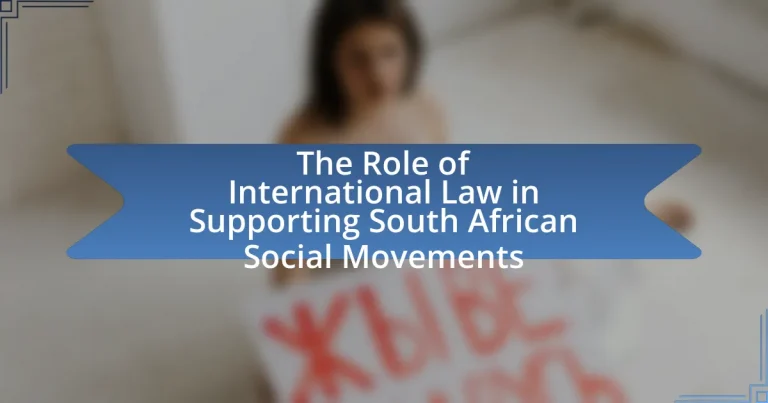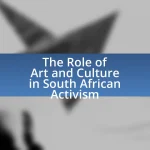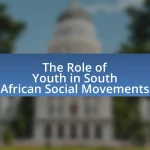The article examines the role of international law in supporting South African social movements, highlighting how legal frameworks such as the International Covenant on Civil and Political Rights and the African Charter on Human and Peoples’ Rights empower activists to advocate for human rights and social justice. It discusses the historical context of these movements, particularly during the apartheid era, and outlines the challenges they face in utilizing international law, including limited resources and political barriers. Additionally, the article explores strategies for leveraging international legal mechanisms, the significance of public awareness, and the potential for future reforms to enhance the effectiveness of international law in promoting social equity in South Africa.
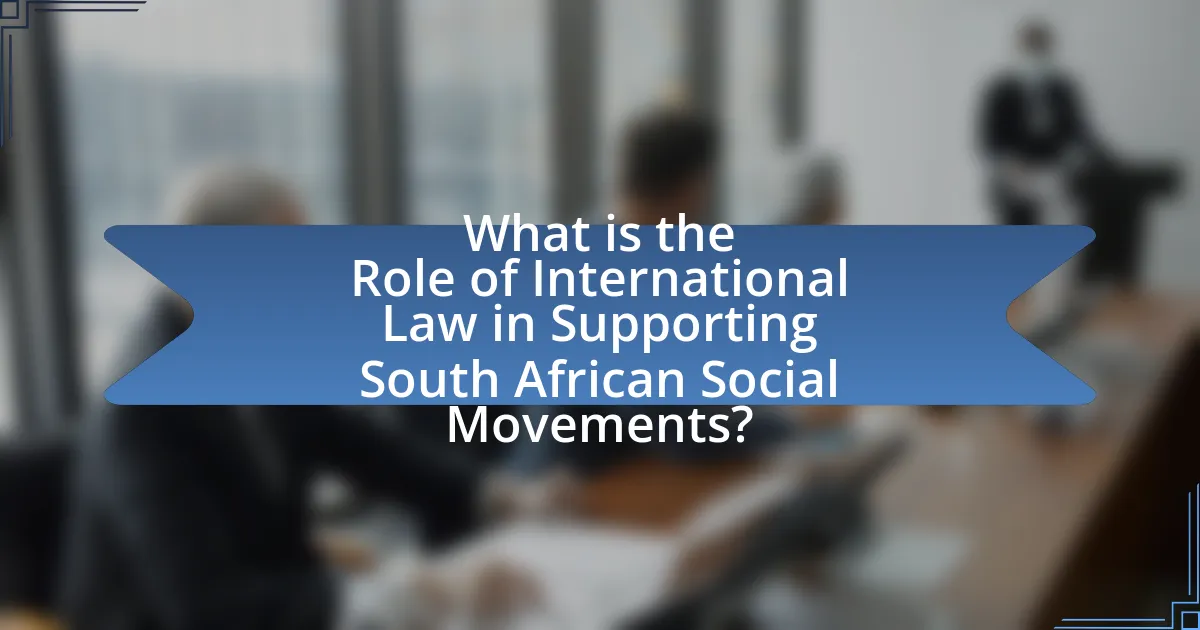
What is the Role of International Law in Supporting South African Social Movements?
International law plays a crucial role in supporting South African social movements by providing a framework for human rights protection and advocacy. This legal framework enables social movements to leverage international treaties, such as the International Covenant on Civil and Political Rights, to hold the South African government accountable for human rights violations. For instance, the African Charter on Human and Peoples’ Rights allows activists to appeal to regional bodies, enhancing their ability to challenge injustices and mobilize public support. Furthermore, international law facilitates the recognition of social movements on a global stage, attracting international solidarity and resources that bolster their efforts for social change.
How does international law influence social movements in South Africa?
International law significantly influences social movements in South Africa by providing a framework for human rights advocacy and accountability. This legal framework empowers activists to challenge injustices and mobilize support both domestically and internationally. For instance, South Africa’s ratification of international treaties, such as the International Covenant on Civil and Political Rights, obligates the government to uphold fundamental rights, which activists leverage to demand change. Additionally, international legal instruments can facilitate the documentation of human rights abuses, as seen in the work of organizations like Amnesty International, which highlights violations and pressures the government to comply with its international obligations.
What are the key international legal frameworks relevant to South African social movements?
The key international legal frameworks relevant to South African social movements include the International Covenant on Civil and Political Rights (ICCPR), the International Covenant on Economic, Social and Cultural Rights (ICESCR), and the African Charter on Human and Peoples’ Rights. These frameworks provide a basis for the protection of rights such as freedom of expression, assembly, and association, which are essential for social movements. The ICCPR, adopted by the United Nations in 1966, obligates state parties to respect and ensure the rights to peaceful assembly and freedom of expression, directly supporting the activities of social movements in South Africa. The ICESCR, also from 1966, emphasizes the right to participate in cultural life and to benefit from social services, which are often central to the demands of social movements. The African Charter, adopted in 1986, reinforces these rights within the African context, promoting the right to assemble freely and to advocate for social change. These frameworks collectively empower South African social movements by providing legal grounds for their actions and demands.
How do these frameworks empower local activists?
These frameworks empower local activists by providing them with legal tools and international support to advocate for their rights and social justice. For instance, international human rights laws, such as the International Covenant on Civil and Political Rights, offer a basis for activists to challenge injustices and hold authorities accountable. Additionally, these frameworks facilitate access to global networks and resources, enabling local movements to gain visibility and solidarity from international organizations, which can amplify their causes and enhance their impact.
Why is international law significant for social justice in South Africa?
International law is significant for social justice in South Africa because it provides a framework for protecting human rights and promoting equality. This framework includes treaties and conventions, such as the International Covenant on Civil and Political Rights, which South Africa has ratified, obligating the state to uphold the rights of all individuals. Furthermore, international law serves as a tool for social movements to advocate for justice, as it offers legal grounds to challenge injustices and discrimination. For instance, the South African Constitution draws inspiration from international human rights standards, reinforcing the importance of these laws in shaping domestic policies and practices that promote social equity.
What historical context shapes the relationship between international law and social movements in South Africa?
The historical context that shapes the relationship between international law and social movements in South Africa is primarily rooted in the apartheid era, which lasted from 1948 to the early 1990s. During this period, the South African government implemented a system of institutionalized racial segregation and discrimination, prompting widespread domestic and international condemnation. International law, particularly human rights treaties and conventions, provided a framework for social movements to challenge the oppressive regime. For instance, the United Nations General Assembly adopted resolutions condemning apartheid, which empowered activists and organizations like the African National Congress to leverage international support. This relationship was further solidified by the global anti-apartheid movement, which utilized international legal instruments to advocate for sanctions and divestment, ultimately contributing to the dismantling of apartheid and the establishment of a democratic South Africa.
How has international law been utilized in past social movements in South Africa?
International law has been utilized in past social movements in South Africa primarily to challenge apartheid and advocate for human rights. Activists leveraged international legal frameworks, such as the Universal Declaration of Human Rights and various United Nations resolutions, to gain global support and legitimacy for their cause. For instance, the African National Congress (ANC) utilized international law to highlight violations of human rights and to call for sanctions against the apartheid regime, which culminated in the imposition of economic and cultural boycotts by various countries. This legal strategy not only mobilized international opinion but also pressured the South African government to negotiate and ultimately dismantle apartheid, demonstrating the significant impact of international law on domestic social movements.
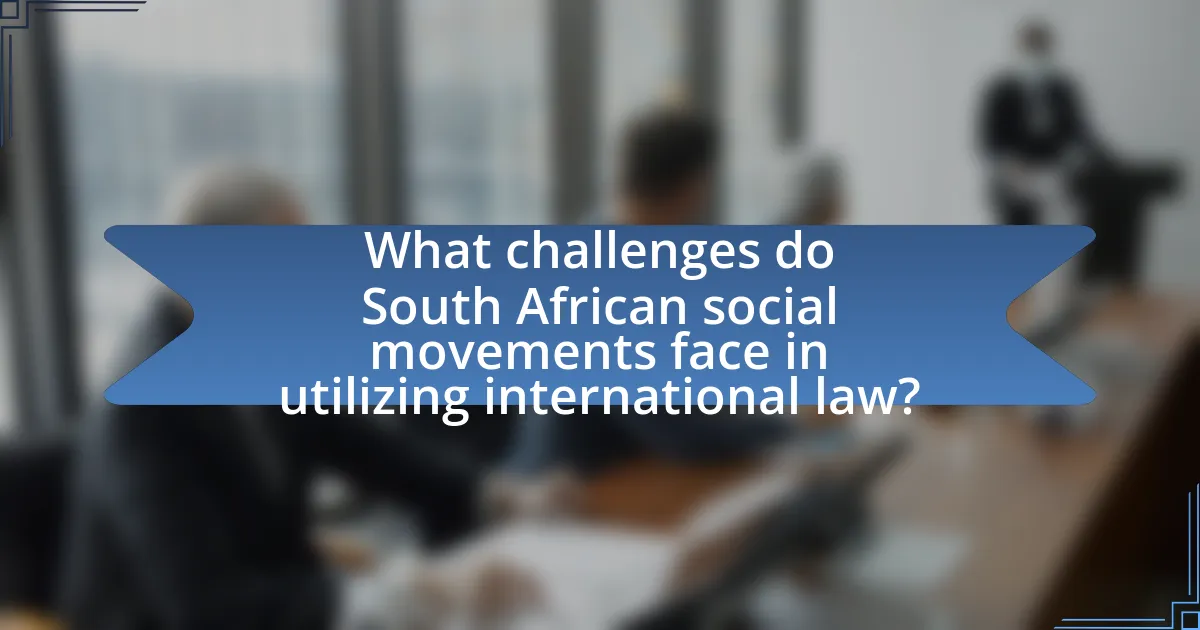
What challenges do South African social movements face in utilizing international law?
South African social movements face significant challenges in utilizing international law, primarily due to limited access to legal resources and the complexities of navigating international legal frameworks. These movements often lack the financial means to engage with international legal processes, which can be costly and time-consuming. Additionally, the South African legal system may not always align with international legal standards, creating barriers to the effective implementation of international law domestically. Furthermore, there is often a lack of awareness and understanding of international legal mechanisms among grassroots organizations, which hinders their ability to leverage these tools for advocacy. The interplay between domestic and international law can also lead to inconsistencies, complicating the efforts of social movements to utilize international law effectively in their campaigns for social justice and human rights.
What barriers exist in accessing international legal mechanisms?
Barriers in accessing international legal mechanisms include lack of awareness, financial constraints, and complex procedural requirements. Many individuals and organizations are unaware of their rights under international law, which limits their ability to seek justice. Financial constraints often prevent marginalized groups from affording legal representation or the costs associated with international litigation. Additionally, the complexity of international legal procedures can deter potential claimants, as navigating these systems often requires specialized knowledge and resources. These barriers collectively hinder effective access to justice for those seeking to utilize international legal mechanisms.
How do political and economic factors hinder the effectiveness of international law for social movements?
Political and economic factors significantly hinder the effectiveness of international law for social movements by creating barriers to enforcement and compliance. Governments often prioritize national interests over international obligations, leading to selective adherence to international law. For instance, in South Africa, political dynamics can result in the government ignoring international human rights treaties when they conflict with domestic policies or economic interests, such as mining or land reform. Additionally, economic pressures, such as reliance on foreign investment, can compel governments to overlook social movements’ demands that align with international law, thereby undermining the law’s authority and effectiveness. This interplay of political and economic considerations often results in a lack of accountability for violations, as seen in cases where social movements advocating for rights are met with state repression rather than legal protection.
What role does public awareness play in overcoming these barriers?
Public awareness is crucial in overcoming barriers faced by South African social movements, as it mobilizes support and fosters understanding of their struggles. Increased public awareness leads to greater visibility of issues such as inequality and human rights violations, which can pressure authorities to act. For instance, campaigns like #FeesMustFall gained traction through social media, highlighting the financial burdens on students and prompting national discussions on education funding. This demonstrates that informed public opinion can influence policy changes and encourage international support, thereby reinforcing the role of international law in advocating for social justice.
How do social movements navigate the complexities of international law?
Social movements navigate the complexities of international law by leveraging legal frameworks, engaging in advocacy, and utilizing international mechanisms to promote their causes. These movements often align their objectives with international human rights standards, such as those outlined in the Universal Declaration of Human Rights, to gain legitimacy and support. For instance, South African social movements have historically invoked international law to challenge apartheid and advocate for social justice, utilizing platforms like the United Nations to raise awareness and apply pressure on the government. By strategically framing their issues within the context of international law, these movements can mobilize resources, attract global attention, and influence domestic policy changes.
What strategies do activists employ to leverage international law for their causes?
Activists employ various strategies to leverage international law for their causes, including advocacy through international human rights mechanisms, strategic litigation, and mobilizing public opinion. By submitting complaints to bodies like the United Nations Human Rights Council, activists can draw attention to violations and seek accountability. Strategic litigation involves using international legal frameworks, such as the African Charter on Human and Peoples’ Rights, to challenge domestic laws or practices that infringe on rights. Mobilizing public opinion through campaigns and social media can amplify their message, pressuring governments to comply with international standards. These strategies have been effective in cases like the legal battles against apartheid-era laws in South Africa, where international law played a crucial role in supporting the fight for justice and equality.
How can collaboration with international organizations enhance the impact of local movements?
Collaboration with international organizations can significantly enhance the impact of local movements by providing access to resources, expertise, and global platforms for advocacy. For instance, international organizations can offer funding and technical support that local movements may lack, enabling them to scale their initiatives effectively. Additionally, partnerships with these organizations can amplify local voices on international stages, drawing attention to specific issues and mobilizing global support. A notable example is the collaboration between South African social movements and international NGOs during the anti-apartheid struggle, which helped to garner worldwide condemnation of the regime and facilitated sanctions against South Africa. This historical context illustrates how such collaborations can lead to tangible changes in policy and public perception, ultimately strengthening the local movements’ objectives.
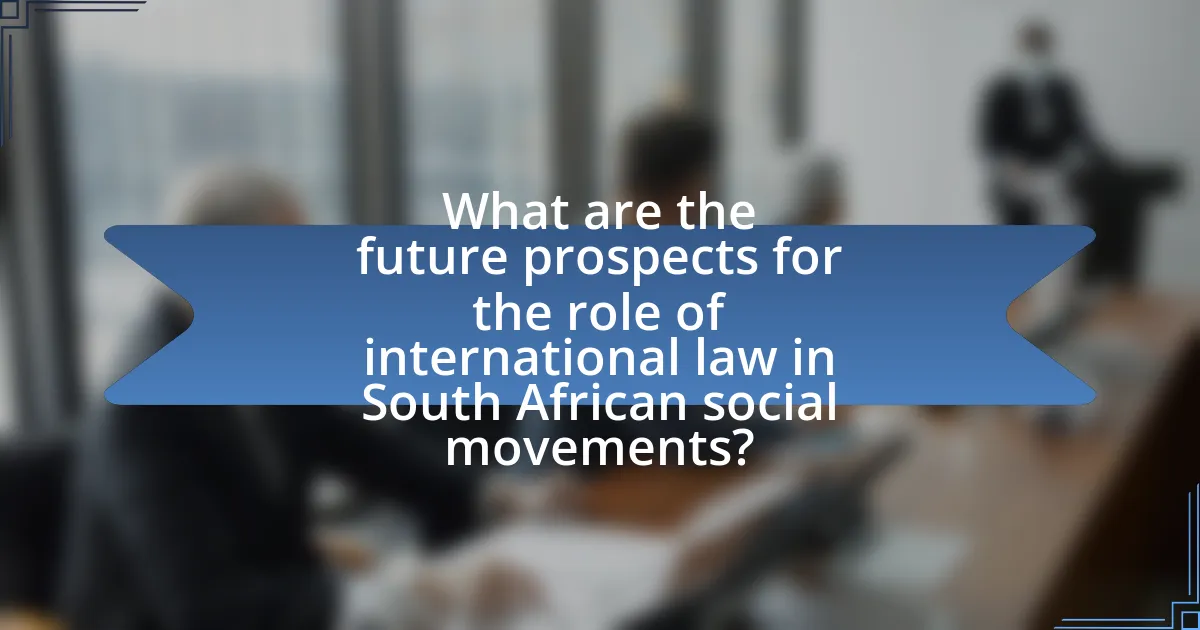
What are the future prospects for the role of international law in South African social movements?
The future prospects for the role of international law in South African social movements are promising, as international legal frameworks increasingly support human rights and social justice initiatives. South African social movements can leverage international treaties, such as the International Covenant on Civil and Political Rights, to advocate for their rights and hold the government accountable. The growing trend of global solidarity and the influence of international NGOs further enhance the capacity of these movements to utilize international law as a tool for change. Additionally, the South African Constitution, which is aligned with international human rights standards, provides a robust legal foundation for social movements to challenge injustices and promote equity.
How can international law evolve to better support social movements in South Africa?
International law can evolve to better support social movements in South Africa by enhancing mechanisms for accountability and protection of human rights. This evolution can occur through the establishment of more robust international treaties that specifically address the rights of activists and the need for state compliance with human rights standards. For instance, the United Nations could strengthen its frameworks for monitoring state actions against social movements, ensuring that violations are documented and addressed. Additionally, international legal bodies could provide clearer guidelines for the protection of peaceful assembly and expression, which are often threatened in South Africa. Historical instances, such as the role of international pressure during the anti-apartheid movement, demonstrate that global advocacy can lead to significant changes in domestic policies. Therefore, by reinforcing legal frameworks and accountability mechanisms, international law can more effectively support social movements in South Africa.
What reforms are necessary within international legal frameworks to address local needs?
Reforms necessary within international legal frameworks to address local needs include the incorporation of local perspectives into decision-making processes and the establishment of mechanisms for accountability and redress. These reforms ensure that international laws are not only applicable but also relevant to the specific socio-economic and cultural contexts of local communities. For instance, the United Nations Declaration on the Rights of Indigenous Peoples emphasizes the importance of recognizing indigenous rights, which can serve as a model for integrating local needs into international legal standards. Additionally, the adoption of flexible legal frameworks that allow for regional adaptations can enhance the responsiveness of international law to local circumstances, as evidenced by the African Charter on Human and Peoples’ Rights, which reflects the continent’s unique challenges and aspirations.
How can South African social movements influence international law development?
South African social movements can influence international law development by advocating for human rights and social justice on global platforms. These movements, such as the anti-apartheid struggle, have historically shaped international norms and treaties, exemplified by the adoption of the Universal Declaration of Human Rights, which was influenced by global awareness raised by South African activists. Furthermore, contemporary movements addressing issues like land reform and environmental justice contribute to the discourse on international legal standards, pushing for reforms that reflect their demands. The participation of these movements in international forums, such as the United Nations, allows them to lobby for changes in international law that align with their objectives, thereby impacting global legal frameworks.
What practical steps can activists take to effectively utilize international law?
Activists can effectively utilize international law by engaging in strategic advocacy, leveraging legal frameworks, and building coalitions. First, activists should familiarize themselves with relevant international treaties and conventions, such as the International Covenant on Civil and Political Rights, which provides a basis for human rights claims. Second, they can document violations of these laws and gather evidence to support their cases, as seen in the successful use of international law by South African activists during the anti-apartheid movement, which drew attention to human rights abuses. Third, forming alliances with international organizations, such as Amnesty International or Human Rights Watch, can amplify their voices and provide additional resources for legal support. By employing these steps, activists can effectively navigate and utilize international law to advance their causes.
What resources are available for activists seeking to understand international law?
Activists seeking to understand international law can access various resources, including academic journals, online courses, and legal databases. Academic journals such as the “International Journal of Human Rights” and “The European Journal of International Law” provide peer-reviewed articles that analyze international legal frameworks and their implications for social movements. Online platforms like Coursera and edX offer courses on international law, often created by reputable universities, which cover fundamental principles and case studies relevant to activists. Additionally, legal databases such as Westlaw and LexisNexis contain extensive collections of international treaties, case law, and legal commentary that can aid activists in their research and advocacy efforts. These resources collectively enhance understanding of international law’s role in supporting social movements, particularly in the South African context.
How can social movements build networks to strengthen their legal strategies?
Social movements can build networks to strengthen their legal strategies by collaborating with legal experts, NGOs, and other movements to share resources and knowledge. This collaboration enhances their understanding of legal frameworks and increases their capacity to advocate for rights effectively. For instance, the Treatment Action Campaign in South Africa successfully partnered with international organizations to leverage legal support in their fight for access to HIV/AIDS treatment, demonstrating how strategic alliances can amplify legal efforts. Such networks facilitate the exchange of best practices and provide access to legal resources, ultimately leading to more robust legal strategies.
